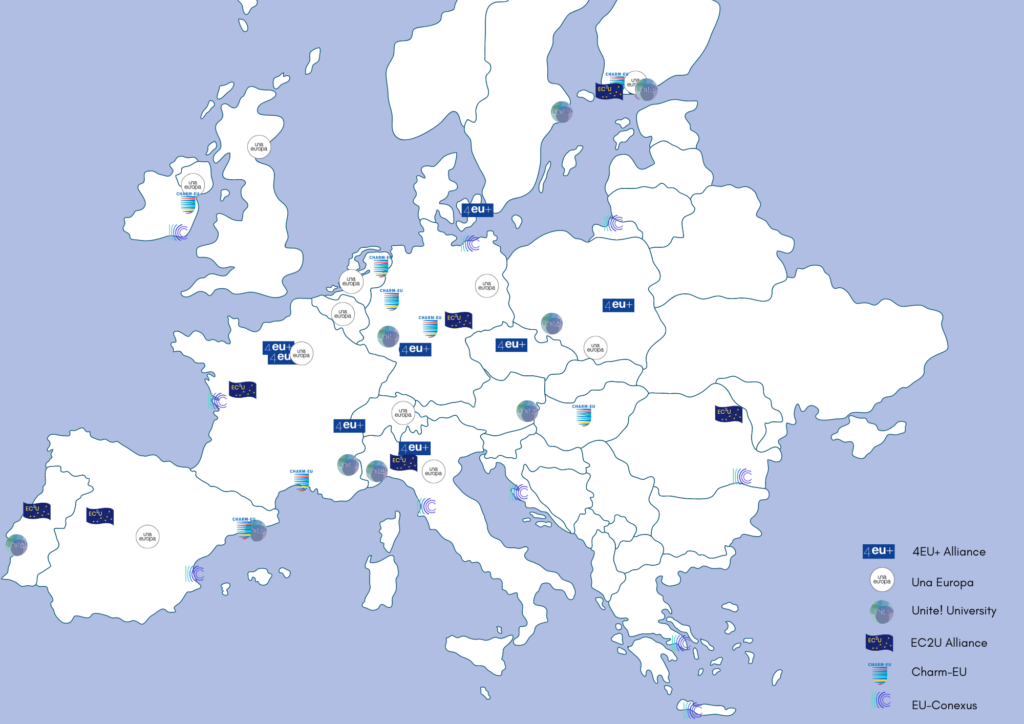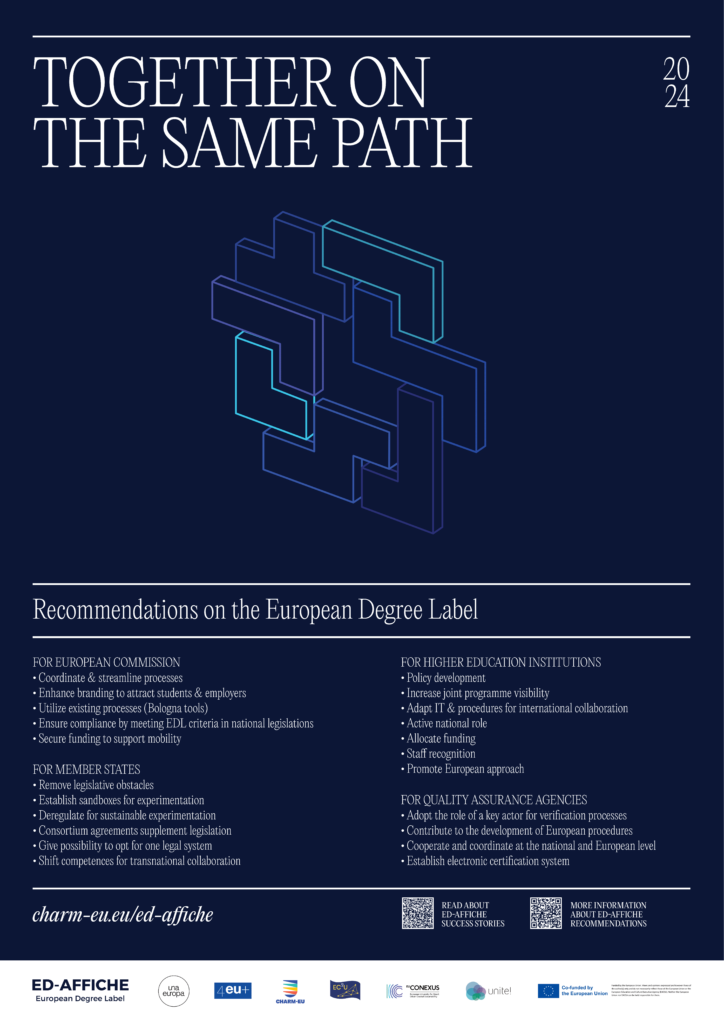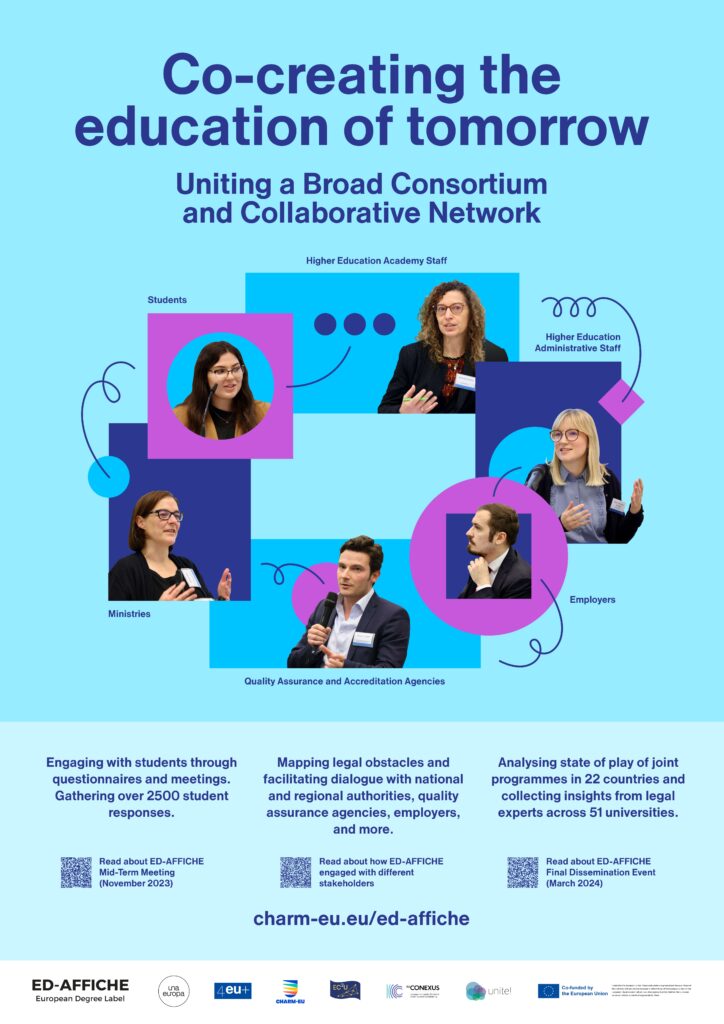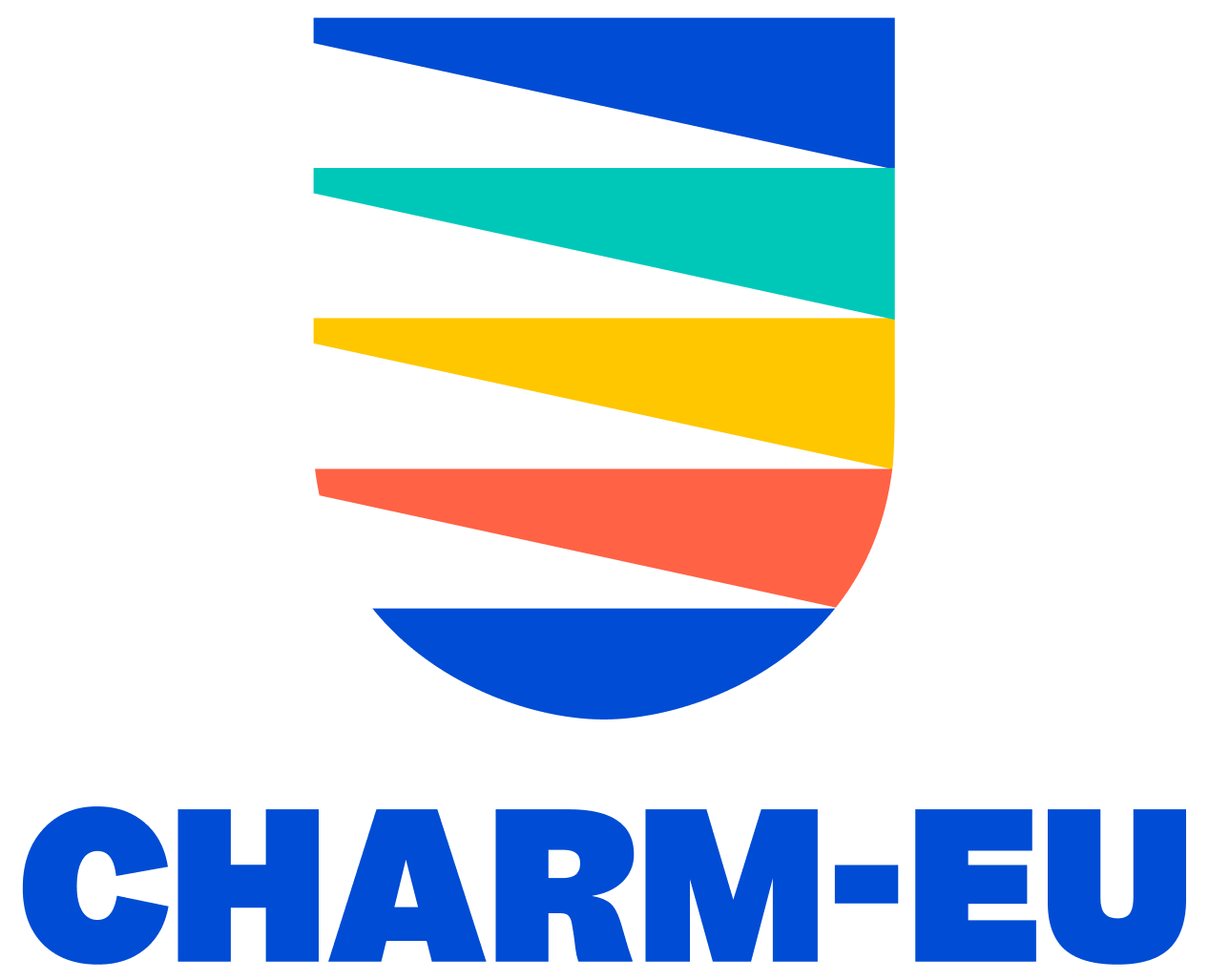ED-AFFICHE
Representing a consortium of six European University Alliances, ED-AFFICHE was a year-long initiative to pilot the European Degree. Through mapping existing joint programmes, analyzing joint programmes criteria and legal hurdles, the consortium developed key recommendations designed to guide the implementation of the European Degree for all stakeholders, including the European Commission, national education authorities, quality assurance agencies, and universities themselves.

Overview
At the core of this project was a strong group of complementary European University Alliances, Una Europa, Unite!, EU-CONEXUS, 4EU+, EC2U and CHARM-EU, and their 51 higher education institutions, covering 22 countries across Europe. ED-AFFICHE is supported by 19 national and regional ministries and 15 national accreditation and quality assurance agencies.
The consortium partners have a long track record of international collaboration and have been at the forefront of co-developing the European Degree policy initiative since the very beginning. The consortium is united by a common vision of the European Degree label as an enabler for removing obstacles and closer collaboration in higher education.
Together, our universities boasted an exceptional portfolio of high-quality joint programmes, spanning all levels of higher education and covering a wide range of academic disciplines and fields. This critical mass of joint programmes was leveraged to conduct a broad mapping exercise of the criteria associated with the European Degree label, subject to a parallel methodology of large-scale surveys and in-depth interviews. In consultations with experts, the project consortium proposed possible improvements to these criteria and co-develop recommendations on the possible assessment procedure and the design and delivery of a future European Degree label.

Recommendations
Obstacles for Transnational Collaboration (Deliverable 3.1)
This comprehensive document brings together countries sharing similar experiences, good practices, and innovative legislative approaches to tackle the challenges associated with joint programmes. It has been written after consultations with legal experts from universities and consultations with national and regional authorities. The document is divided into 5 different categories: Accreditation, Quality Assurance of New Programmes, Flexible Learning Paths, Curricula, and Governance Structures.
It was crafted through consultations with legal experts from universities partners of ED-AFFICHE. The document is structured into five categories: Accreditation, Quality Assurance of New Programmes, Flexible Learning Paths, Curricula, and Governance Structures. Each section addresses existing obstacles, potential solutions, and proposed legislations. This comparative analysis laid the groundwork for the discussions with authorities and set the stage for the ED-AFFICHE “Policy Report on Best Practices and Recommendations for the Future Development and Implementation of Joint Programmes in Europe” (D3.2). The document’s refinement was enriched by feedback from legal experts within the consortium’s universities.
Comparative analysis of the criteria associated to the European Degree label and the process behind it (Deliverable 4.1)
This document consolidates perspectives from diverse stakeholders, including joint programmes directors or coordinators from ED-AFFICHE partner and associated partner universities, national and regional authorities, QA and accreditation agencies, employers, and notably, students and PhD students. It aims to assess the criteria proposed by the European Commission concerning the European Degree label.
For each criterion, the authors succinctly present the viewpoints of various stakeholders on its relevance and feasibility, wherever available. Additionally, the document includes recommendations for enhancing and refining each criterion as deemed necessary.
Consolidated Report on Outcomes of European Degree Criteria Mapping Exercise (Deliverable 2.2)
The document succinctly presents findings from the ED-AFFICHE questionnaire, gathering insights from joint programme directors and coordinators. It captures their perspectives on the European degree label, associated criteria, and their views on possible barriers to joint degrees within their respective countries. Complementing questionnaire responses, interviews were conducted through focus groups organized by Country.
Organized into three main sections, the document includes a summary profiling the respondents, a comprehensive mapping of the applicability of the proposed criteria for the joint European Degree label, and an analysis of perceived barriers. This analysis is viewed through the lens of academic directors, coordinators of joint programmes, and involved administrative staff with potential contrasts explored in comparison to legal experts’ perspectives and ED-AFFICHE’s analysis of obstacles to transnational collaboration.
The primary goal of this document is to offer a comprehensive overview of the application of proposed criteria associated with the European Degree label in existing joint programmes. It sheds light on perceived obstacles hindering increased collaboration among universities. Furthermore, it provides recommendations to incentivize programme directors and coordinators to pursue the European Degree label or find motivation in it to forge new collaborations.
ED-AFFICHE Policy Report on best practices & recommendations on the future development & implementation of joint programmes in Europe (Deliverable 3.2)
This document is a follow-up to the ED-AFFICHE 3.1 Deliverable titled “ED-AFFICHE Analysis of the Obstacles for Transnational Collaboration in Higher Education” in which the ED-AFFICHE Consortium mapped and analyzed legal obstacles in 20 countries and ranked them in a color-coded grid. The present deliverable 3.2, “ED-AFFICHE Policy Report on best practices & recommendations on the future development & implementation of joint programmes in Europe” compasses an overview of solutions for these obstacles derived from consultations with legal experts at university partners and associated entities of ED-AFFICHE, alongside policy recommendations tailored for the European Commission and member states. The strength of the ED-AFFICHE approach and proposed solutions, lies in the diversity and impressive aggregation of feedback, data, and opinions collected over the one-year timeframe of ED-AFFICHE, encompassing input from national and regional authorities, students, employers, quality assurance agencies, university staff, and beyond.
This deliverable provides an overview of the legal context for transnational collaboration among universities within each of the 22 countries represented in ED-AFFICHE, accompanied by recommendations aimed at facilitating smoother implementation processes for HEIs.
ED-AFFICHE Policy Recommendations on the Future of the European Degree (label) (Deliverable 4.2)
This document offers extensive policy recommendations, drawing from input gathered from various stakeholders including students, quality assurance agencies, employers, university legal experts, joint programme coordinators, and national authorities. Its aim is to provide comprehensive guidance to the European Commission, member states, universities, and quality assurance agencies on implementing the European Degree Label and, to some extent, the European Degree.
Titled “ED-AFFICHE Policy Recommendations on the Future of European Degree (Label)”, the document outlines key aspects regarding the European Degree Label, including pathways proposed by the European Commission, criteria revisions, verification methods, label and degree design propositions, and concluding recommendations.
Key themes emerging include the need for European Commission coordination, the enhancement of Bologna tools, ongoing collaboration at the national level, and sustained exchange within established expertise communities.
Success stories: Overcoming legal obstacles in joint programmes across europe
These success stories exemplify the collective efforts of ED-AFFICHE partners in navigating legal complexities and fostering an environment favorable to international higher education collaboration.
Austria
During the ED-AFFICHE national workshop in October 2023, Austrian HEIs highlighted the limitation regarding diploma format and issuance, impeding international ambitions. Promptly, the Ministry proposed a pragmatic solution, showcasing their willingness to support HEIs in overcoming legal barriers to joint programmes.
Czech republic
Thanks to ED-AFFICHE, discussions centered on introducing European Degree criteria into legislation. Recognizing the lengthy process of legislative updates, stakeholders proposed a practical solution: incorporating criteria into internal ministerial guidelines for expedited implementation while allowing flexibility for future adjustments.
France
Despite delays in legal changes, HEIs and government officials continue discussions to address obstacles identified by ED-AFFICHE. Recent seminars and meetings underscore ongoing efforts to explore alternative approaches, such as enhancing flexibility for specific types of university diplomas, aligning with European standards while accommodating national regulations.
Greece
Greek universities are collaboratively advocating for legislative clarifications and funding equity to support joint programmes. Government responsiveness to universities’ requests and its active collaboration with ED-AFFICHE signal a positive outlook for legislative adjustments conducive to international collaboration.
Italy
Recent legislative revisions in Italy, including increased curriculum flexibility and recognition of extracurricular activities, highlight proactive steps toward aligning national regulations with European standards. Additionally, ongoing developments, such as the forthcoming platform for international educational agreements, demonstrate Italy’s commitment to facilitating transnational collaboration among universities.
Poland
In response to legal obstacles identified by ED-AFFICHE, Polish HEIs prepared a comprehensive proposal for legislative amendments, emphasizing concrete changes to enhance the regulatory framework for joint programmes.
Spain
The establishment of a permanent group of Spanish Universities participating in European Alliances signifies a proactive approach to address educational needs collaboratively. Through ongoing dialogue between HEIs and governmental bodies, Spain demonstrates a commitment to fostering cooperation and aligning national regulations with European standards.
ED-AFFICHE BRochure & posters
The European Commission, the 9 Erasmus+ pilots on the European Degree label and on the possible European legal status for European Universities Alliances gathered with national and regional authorities, quality assurance agencies and other stakeholders to discuss about the European Degree package adopted on 27 March 2024. The event “A blueprint for a European Degree” was hosted at Université Libre de Bruxelles by the SMARTT pilot on the 29 April 2024.
The aim of the event was to present the outcomes of the Erasmus+ pilot projects and raise awareness of the added value of a European degree, foster understanding, and encourage the higher education community and Member States to engage in the blueprint for a European degree, in line with the Commission Communication on a blueprint for a European degree.
The ED-AFFICHE Team developed a brochure highlighting the achievements of the one-year pilot project and summarizing key recommendations for the European Degree.
During the poster session, ED-AFFICHE presented two posters. The first poster is focused on our recommendations for the different stakeholders. The second poster is focused on the collaborative efforts of ED-AFFICHE to co-create the results of the project with a diverse and large number of stakeholders.


Partners
Una Europa is an alliance of 11 leading universities from all corners of Europe. Together, they are forging a new path for education and research in Europe and beyond to shape our shared future for the better. The Una Europa community spans more than half a million students, 100,000 members of staff and 10 languages, grounded in over 1,000 years of collective heritage.
Founded in 2019, Una Europa has secured successive rounds of European Union funding to realise its vision for a European ‘University of the Future’: a truly inter-university and pan-European campus, shaped by universities’ universal and fundamentally interwoven obligations to society: research and innovation, teaching and learning, and societal outreach.
The 4EU+ European University Alliance brings together 7 comprehensive, research-intensive, public universities from four regions of Europe: Charles University, Heidelberg University, Sorbonne University, Universities of Copenhagen, Geneva, Milan and Warsaw.
The vision of the 4EU+ Alliance is to create One Comprehensive Research European University, contributing to the building up of the European Education and Research Areas by 2025 and beyond. 4EU+ seeks to strengthen the European concept of mutual enrichment by developing a new quality of cooperation in teaching, education, research and administration, leading to the creation of a truly integrated European University System.
CHARM-EU is a Challenge-driven, Accessible, Research-Based and Mobile European University Alliance. At CHARM-EU we work together to design and create a new university model.
The Alliance is formed by nine higher education institutions across Europe. Launched in 2019, CHARM-EU is co-funded by the Erasmus+ project and is designed to enable mobility among students and staff and to embody the excellence, inclusiveness and competitiveness of European higher education. The CHARM-EU programmes are focused on addressing the challenges of the 21st century and are aligned with European values, the European Green Deal and the United Nation’s Sustainable Development Goals.
The European Campus of City-Universities (EC2U) is a multi-cultural and multi-lingual Alliance consisting of 7 universities from diverse regions of the European Union. Based on 3 SDGs, EC2U offers numerous events and training opportunities across the Alliance, among which are:
– Joint Master’s Programmes providing tailored and multiple mobility schemes, “à la carte” study plans, and multidisciplinary courses;
– A toolkit of common platforms and tools to foster collaboration and mobility opportunities;
– A joint student and campus life, centered around student opportunities which are fully promoted by a mobile app.
EU-CONEXUS is a strong partnership between nine universities that opens opportunities to foster close cooperation between university, society and socio-economic partners, enabling smart solutions for developing coastal areas in a sustainable way.
The thematic focus creates a unique competitive advantage which is well positioned to assemble and build on complementary thematic expertise from all its partners and regional ecosystems, through inter- and transdisciplinary based approaches.
Unite! is a European University alliance of innovation, technology and engineering of nine universities connecting European regions of economic prospect, entrepreneurship and innovation. A strategic, agile and dynamic alliance of universities based on shared values with a common vision and mutual trust. Unite! commits to being a strong driving force for technology and innovation, a multilingual trans European campus that Will train the experts and leaders that drive the digital and green transition.
Unite! stands out
as a strong driving force for technology and innovation advancing a green and digital Europe
for transformative transdisciplinarity drawing from engineering, science and the full range of multidisciplinearity of the member universities
Coordinator
KATHOLIEKE UNIVERSITEIT LEUVEN (BELGIUM)
Full partners
FUNDACION UNIVERSIDAD CATOLICA DE VALENCIA (SPAIN)
KUNGLIGA TEKNISKA HOEGSKOLAN SE
UNIVERSITA DEGLI STUDI DI PAVIA I(ITALY)
UNIVERSITAT DE BARCELONA (SPAIN)
UNIVERZITA KARLOVA CZ
Associated partners
AUSTRIA:
TECHNISCHE UNIVERSITAET GRAZ
BELGIUM:
COIMBRA GROUP ASBL
ERASMUS MUNDUS STUDENTS AND ALUMNI ASSOCIATIO
UNA EUROPA
VLAAMSE GEMEENSCHAP
CROATIA:
SVEUCILISTE U ZADRU
CYPRUS:
FREDERICK UNIVERSITY FU
MINISTRY OF EDUCATION, CULTURE, SPORT AND YOUTH
THE CYPRUS AGENCY OF QUALITY ASSURANCE AND ACCREDITATION
CZECH REPUBLIC:
MINISTRY OF EDUCATION YOUTH AND SPORTS
DENMARK:
KOBENHAVNS UNIVERSITET
UDDANNELSES- OG FORSKNINGSSTYRELSEN
FINLAND:
AALTO-YLIOPISTON YLIOPPILASKUNTA -AALTO-UNIVERSIT
ABO AKADEMI
HELSINGIN YLIOPISTO
TURUN YLIOPISTO
FRANCE:
HAUT CONSEIL DE L’EVALUATION DE LA RECHERCHE ET D
LA ROCHELLE UNIVERSITE
SORBONNE UNIVERSITE
UNIVERSITE DE MONTPELLIER
UNIVERSITE DE POITIERS
UNIVERSITE GRENOBLE ALPES
UNIVERSITE PARIS I PANTHEON-SORBONNE
GERMANY:
FREIE UNIVERSITAET BERLIN
FRIEDRICH-SCHILLER-UNIVERSITAT JENA
HOCHSCHULE RUHR WEST
JULIUS-MAXIMILIANS-UNIVERSITAT WURZBURG
MINISTERIUM FUER WISSENSCHAFT, FORSCHUNG UND KUNST BADEN-WUERTTEMBERG
RUPRECHT-KARLS-UNIVERSITAET HEIDELBERG
TECHNISCHE UNIVERSITAT DARMSTADT
UNIVERSITAET ROSTOCK
GREECE:
GEOPONIKO PANEPISTIMION ATHINON
ELLENIC AUTHORITY FOR HIGHER EDUCATION
HUNGARY:
EOTVOS LORAND TUDOMANYEGYETEM
MAGYAR FELSOOKTATASI AKKREDITACIOS BIZOTTSAG
IRELAND:
THE PROVOST, FELLOWS, FOUNDATION SCHOLARS & THE
UNIVERSITY COLLEGE DUBLIN, NATIONAL UNIVERSITY OF
WATERFORD INSTITUTE OF TECHNOLOGY
ITALIA:
AGENZIA NAZIONALE DI VALUTAZIONE DEL SISTEMA UNIVIT
ALMA MATER STUDIORUM – UNIVERSITA DI BOLOGNA
ASSOCIAZIONE CIMEA
MINISTERIO DELL’UNIVERSITÀ E DELLA RICERCA
POLITECNICO DI TORINO
UNIVERSITA DEGLI STUDI DI MILANO
LITHUANIA:
KLAIPEDOS UNIVERSITETAS
LIETUVOS RESPUBLIKOS SVIETIMO, MOKSLO IR SPORTO
STUDIJU KOKYBES VERTINIMO CENTRAS
POLAND:
MINISTERSTWO EDUKACJI I NAUKI
POLITECHNIKA WROCLAWSKA
UNIWERSYTET JAGIELLONSKI
UNIWERSYTET WARSZAWSKI
PORTUGAL:
UNIVERSIDADE DE COIMBRA
UNIVERSIDADE DE LISBOA
ROMANIA:
AGENTIA ROMANA DE ASIGURARE A CALITATII IN INVATA
MINISTERUL EDUCATIEI
UNIVERSITATEA ALEXANDRU IOAN CUZA DIN IASI
UNIVERSITATEA TEHNICA DE CONSTRUCTII BUCURESTI
SPAIN:
AGENCIA PER A LA QUALITAT DEL SISTEMA UNIVERSITARI
AVAP AGENCIA VALENCIANA D’AVALUACIO I PROSPECTIVA
MINISTERIO DE UNIVERSIDADES
UNIVERSIDAD COMPLUTENSE DE MADRID
UNIVERSIDAD DE SALAMANCA
UNIVERSITAT POLITECNICA DE CATALUNYA
SWITZERLAND:
SCHWEIZERISCHER AKKREDITIERUNGSRAT
STAATSSEKRETARIAT FÜR BILDUNG, FORSCHUNG UND INNOVATION
UNIVERSITAT ZURICH
UNIVERSITE DE GENEVE
THE NETHERLANDS:
MINISTERIE VAN ONDERWIJS, CULTUUR EN WETENSCHAP
NEDERLANDS-VLAAMSE ACCREDITATIE ORGANISATIE
UNIVERSITEIT LEIDEN
UNIVERSITEIT UTRECHT
UNITED KINGDOM:
THE UNIVERSITY OF EDINBURGH
external advisory committee
The External Advisory Committee is charged with providing external viewpoints and feedback on major project outputs. It is composed by student, employer, higher education and quality assurance agencies’ representatives.
